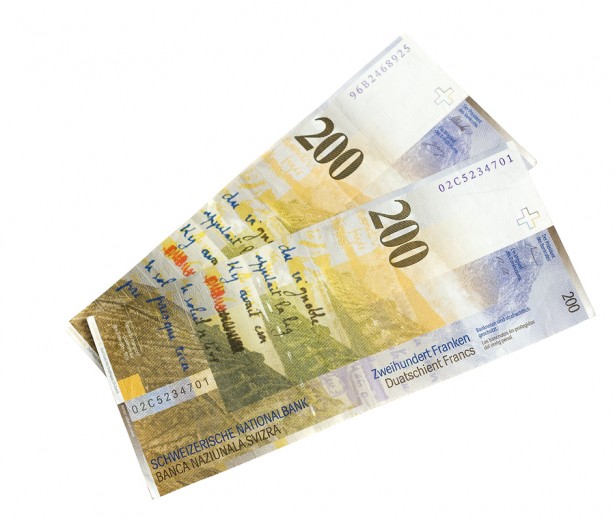In a surprise move that sent shockwaves throughout markets everywhere, the Swiss National Bank (SWB) announced it would institute an interest rate of -0.25 percent on large deposits held by investors in Swiss francs. This move is meant to discourage investors from seeking the franc as a safe haven.
With oil prices continuing to decline and the Russian economic collapse unfolding, many investors have been actively seeking out more stable assets, including the franc, a currency of choice for a lot of those individuals who are concerned over the financial events transpiring.
The result of the negative interest rate was a weakened franc as it traded downwards of 0.3 percent against the euro. When compared to the United States dollar, the franc dropped 0.7 percent and fell to a 28-month low.
For years, the franc has remained strong because of its image as a dependable safe haven purchase. Also, the weakness in the eurozone economies has contributed to the franc’s attractiveness. The SNB is concerned that it would import deflation and hurt the nation’s exporters, a segment of the market that relies on the eurozone to buy their goods.

“Over the past few days, a number of factors have prompted increased demand for safe investments,” the SNB said in a statement. “The introduction of negative interest rates makes it less attractive to hold Swiss franc investments.”
The SNB further added that the 0.25 percent fee will be charged on the Swiss franc sight deposit balances that go beyond a limited amount, something that may be different among account holders. It is estimated that the minimum could be 10 million francs.
In its statement, it warned that it can push the negative interest rate even further if needed.
The negative interest rate will become effective Jan. 22, one day after the European Central Bank (ECB) meets to discuss monetary policy – analysts expect ECB president Mario Draghi to introduce aggressive quantitative easing, money-printing schemes to revamp the eurozone economy and fight against deflation.
For the past several months, the SNB has repeatedly hinted that it would not rule out the possibility of introducing negative interest rates. However, many had expected that the central bank would wait until at least the next ECB policy meeting and refrain from taking such immediate action.
“The SNB reaffirms its commitment to the minimum exchange rate of Sfr1.20 per euro, and will continue to enforce it with the utmost determination,” the bank said in a statement. “It remains the key instrument to avoid an undesirable tightening of monetary conditions resulting from a Swiss franc appreciation.”
As we reported, the ECB has implemented a negative interest rate policy in order to encourage financial institutions to lend money instead of parking it in the vaults. Other nations have utilized this type of policy measure, including Denmark, and the governments immediately overturned the move because it was considered disastrous.
The Bank of Japan (BOJ) has also enhanced its easing measures by ramping up its purchases of government bonds and other assets by as much as 20 trillion yen ($181 billion) for a total of 80 trillion yen ($725 billion) every year. The Federal Reserve, meanwhile, has ended its massive QE program, and now Wall Street is waiting for the central bank to raise rates, which they say will take place in the second quarter of next year.



